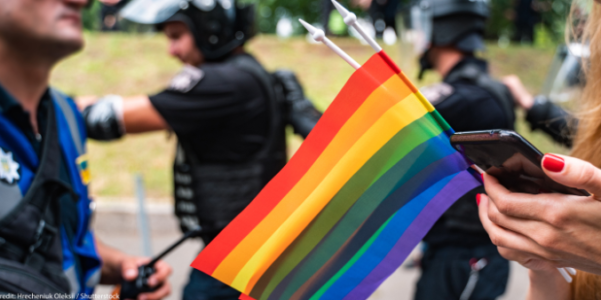Survey reveals a lack of awareness around Section 377A and its implications for LGBTQ+ rights.
Whenever surveys, like those conducted by Ipsos Public Affairs and Blackbox Research, assess public sentiment on Section 377A of the Penal Code, the results frequently show that most Singaporeans support retaining this law. The government often uses these findings to defend the need to keep this colonial-era legislation on the books, despite not enforcing it.
However, attitudes have begun to shift. On June 16, Ipsos Public Affairs released its latest findings on a study involving 500 Singaporeans and permanent residents, revealing that support for the law has declined from 55% in 2018 to 44% in 2022. Conversely, opposition to 377A rose from 12% to 20% during the same period. For advocates of repeal, this represents a hopeful and progressive trend, indicating a gradual shift toward the outcomes the LGBTQ+ community has long sought.
Despite this shift, the question remains: how well do Singaporeans understand 377A? A recent survey we commissioned with Milieu Insight involving 1,000 Singapore citizens may shed light on how to bolster support for repealing 377A through education.
When asked how much they knew about Section 377A, only 9% reported being well-informed, while 42% claimed to know a little, and 50% admitted they knew nothing. Furthermore, only 12% of respondents understood the reasons behind the enactment of 377A, with 67% knowing only a little and 20% being completely unaware.
Mr. Leow Yangfa, the executive director of Oogachaga, a local nonprofit organization supporting the LGBTQ+ community, expressed his lack of surprise at the low level of awareness regarding the law. He noted that for many, particularly those not part of the LGBTQ+ community, the law feels irrelevant and does not directly impact their lives.
To gauge public sentiment on 377A accurately, it’s crucial for Singaporeans to first understand the law’s history. For instance, how many are aware that this law, enacted in 1938, was not created by the current Singapore government but is instead a colonial legacy left by the British? Do they know that documents recently declassified by the British government reveal that 377A was introduced due to racism, not homophobia?
The importance of education in shaping opinions cannot be overstated. Our survey found that knowledge of 377A significantly influences respondents’ views on LGBTQ+ rights in Singapore. For example, 54% of respondents who knew nothing about the law felt that no action was needed to improve LGBTQ+ rights, whereas 68% of those well-informed about 377A believed that more should be done.
Interestingly, while 84% of well-informed respondents and 79% of those who knew a little agreed that LGBTQ+ individuals experience discrimination, 69% of those who knew nothing about 377A also recognized this discrimination. However, only 13% from this group believed that different rights based on sexual orientation were unfair.
Mr. Leow suggested that this disconnect may stem from a general lack of human rights education in Singapore. Many respondents might not understand that human rights are universal and inalienable, rather than a “foreign” concept. As a member of the United Nations, Singapore is a signatory to the Universal Declaration of Human Rights.
The survey also revealed a troubling trend: those unfamiliar with 377A tend to not know any LGBTQ+ individuals. Among respondents who knew nothing about the law, 58% reported not knowing anyone from the LGBTQ+ community. In contrast, 91% of well-informed respondents personally knew someone from the community.
Without meaningful interactions with LGBTQ+ individuals to learn about their experiences, many remain apathetic about improving LGBTQ+ rights, and some may even feel that it is fair for fellow Singaporeans to have different rights based on sexual orientation.
Jordan Tang, lead volunteer at the Pelangi Pride Centre, highlighted the necessity for education regarding Section 377A, its enactment reasons, and the discrimination faced by the LGBTQ+ community. He emphasized the importance of safe spaces, like Pelangi Pride Centre, for such educational initiatives.
The government has not made a policy announcement regarding 377A in nearly two decades, but there are indications that change may be on the horizon. The government has begun consultations and is preparing to conduct a survey in conjunction with Minister K Shanmugam’s parliamentary statement, even as some criticize the survey’s methodology.
In Singapore, engagement with various stakeholders often signals potential policy changes. While it remains to be seen how the government will act, any repeal of 377A may still depend on the political climate.
If the government were to repeal 377A, there are two potential scenarios: one where the government enacts further policy changes, such as legalizing same-sex marriage and equal housing rights for LGBTQ+ couples, and another where it maintains the status quo while repealing 377A.
Given the government’s focus on the traditional heterosexual family unit, significant changes seem unlikely. Instead, a more moderate “Goldilocks” approach—one that aims to balance both sides—might be more realistic.
As Mr. Leow noted, the low awareness of 377A suggests that a future repeal might not substantially affect the lives of most Singaporeans. Minister K Shanmugam has mentioned consulting “diverse groups of Singaporeans” on the future of this law, but regardless of the outcome, it may be prudent for both sides of the debate to prepare for a compromise rather than a definitive victory.
All these possibilities remain speculative, but it is evident that progress hinges on bridging the knowledge gap surrounding Section 377A and the realities faced by the LGBTQ+ community.








